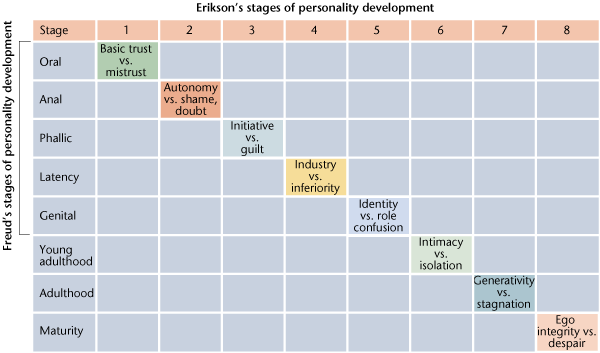- Erikson’s theories are the best-known theories of personality and development.
- Erikson believed that personality develops in a series of predetermined stages.

- His theories are psychosocial, and not psychosexual.
- Describes the impact of social experience across the whole lifespan.
- In each stage of development, Erikson described conflicts that act as turning points in life.
- In Erikson’s view, these conflicts are centered on either developing a psychological quality or failing to develop that quality.
Erikson’s eight stages of development are:
- Trust VS. Mistrust – Infants learn about the basic trustworthiness of the environment. If they receive attention and affection -> they form a global impression of a trustworthy and secure world. If they receive pain and stress -> they believe life is unpredictable and untrustworthy.
- Autonomy VS. Shame and Doubt – Toddlers discover their own bodies and how to control them. If they succeed in doing things for themselves -> gain a sense of self-confidence and self-control. If they fail continuously -> feel shame and self-doubt.
- Initiative VS. Guilt – Children at age 4 or 5 explore beyond themselves. If exploration, projects, and activities are effective -> learn to deal with people and things in a constructive way and have a strong sense of initiative. If they criticized or punished -> learn to feel guilty for many of their own actions.
- Industry VS. Inferiority – Children at ages 6 to 11 develop numerous skills. One’s sense of self is enriched by realistic development. A negative evolution is damaging at this time.
- Ego Identity VS. Ego Diffusion – Before adolescence, children learn a number of different roles. It is important to sort out and integrate these various roles into one constant identity. If a child fails to do this, the result is what Erikson calls ego diffusion.
- Intimacy VS. Isolation – In late adolescence and young adulthood, the central conflict is that of intimacy and isolation. This is the ability to share one’s self with another person of either sex without fear of losing one’s own identity.
- Generativity VS. Self-absorption – In adulthood, men and women are free to direct their attention more fully to the assistance of others. Individuals can direct energy without conflict to the solution of social issues. Failure to resolve earlier conflicts -> results in a preoccupation with one’s self.
- Integrity VS. Despair – In the last stages of life, individuals look back over their lives and judge them. If one looks back at their life and is satisfied -> has a sense of integrity. If one’s life seems to have misdirected energies and lost chances -> has a sense of despair.

